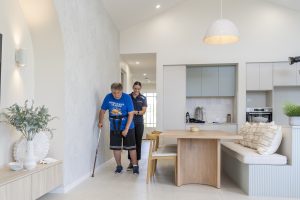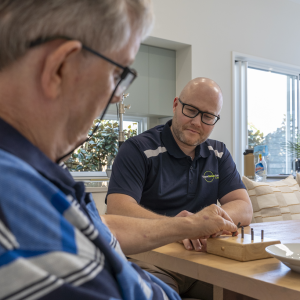
When it comes to health, what we don’t notice can sometimes cause the most harm. Small issues like occasional joint pain, mild fatigue, or trouble with balance can seem minor at first. But over time, they can snowball into much bigger problems. That’s why identifying issues early and getting support from allied health professionals, especially through mobile and in-home therapy, is so important. For people supported by the NDIS, acting early can help preserve independence and quality of life.
Why Acting Early Makes a Difference
Health concerns often develop gradually. Slower movement, more frequent falls, or difficulty with daily activities may appear to be harmless at first. But these early signs can quickly become more serious if left unaddressed. With early intervention, many of these issues can be managed or even prevented. Timely support means fewer complications, reduced need for high-level care, and a better chance of staying active and independent.
The Compounding Effect of Health Issues
One small problem can lead to others. For example, if someone stops walking as much due to joint pain, their muscles may weaken. That can lead to more instability, increasing the risk of falls. Falls can then result in hospital stays, reduced confidence, and further loss of independence. It becomes a cycle that’s difficult to break.
This is where early support makes a real difference. By stepping in early with the right care plan, allied health professionals can help slow or stop that decline. In-home and mobile services make it easier for people to receive this support without the stress of travelling to appointments.
Signs That Shouldn’t Be Ignored

It’s easy to overlook early warning signs. But recognising them and getting help quickly can change everything. Some common early indicators include:
- Trouble getting in and out of bed or chairs
- Unsteadiness when walking, or near-falls
- Avoiding stairs or uneven surfaces
- Increased fatigue with everyday activities
- Struggling with meal preparation or self-care tasks
Even if these signs don’t seem serious, they can point to underlying issues that are easier to address sooner rather than later.
How Allied Health Professionals Can Help
A team of allied health providers works together to look at the whole picture and provide a care plan tailored to each person’s needs. Here’s how each role contributes:
Physiotherapists focus on restoring movement, strength, and balance. They work on building confidence and helping people regain function through tailored exercises.
Occupational Therapists look at how a person is managing daily activities like showering, dressing, or cooking. They provide strategies or recommend equipment to make these tasks easier and safer.
Exercise Physiologists help create safe, effective exercise programs that improve mobility and fitness, especially for people with chronic conditions.
Dietitians support people who may not be eating enough or are dealing with diet-related health issues. They help maintain energy, support healing, and improve overall wellbeing.
This type of support is most effective when it’s delivered in the environment where someone lives and moves every day. Mobile and in-home services allow therapists to assess a person’s real-world needs, from navigating stairs to using the bathroom or cooking a meal. It’s not just about exercises; it’s about creating lasting changes that improve daily life.
The Role of the NDIS in Early Intervention
The NDIS recognises the value of early support. Many of the services allied health professionals provide fall under Capacity Building supports, which are designed to help people build skills and reduce reliance on support over time. This includes things like improving daily living skills, mobility, communication, and health and wellbeing.
For participants already experiencing changes in their health, updating their plan or accessing early intervention funding can make a big difference. Allied health reports can help NDIS planners understand the need for in-home therapy and support tailored to each individual’s goals.
A Smarter Way to Stay Independent

Waiting until a health issue becomes a crisis often means more hospital stays, more stress, and more support needs down the track. Acting early is not just better for the individual, it’s more sustainable for everyone involved—families, carers, and support networks.
With the right help at the right time, people can stay in their homes longer, keep doing the things they enjoy, and maintain control over their daily lives. That’s the goal.
Let’s Talk About What’s Next
If you or someone you support is starting to experience changes in health or function, now is the time to act. Early support from qualified mobile allied health professionals can make a world of difference.
At Team Rehab Solutions, we bring therapy to you—where you live, and where you’re most comfortable. Our experienced team includes physiotherapists, occupational therapists, dietitians, and exercise physiologists who work together to provide practical, tailored support.
Call Team Rehab Solutions on (07) 5597 6544 or submit an enquiry to learn more about how we can help you or a loved one take action early and live well.
